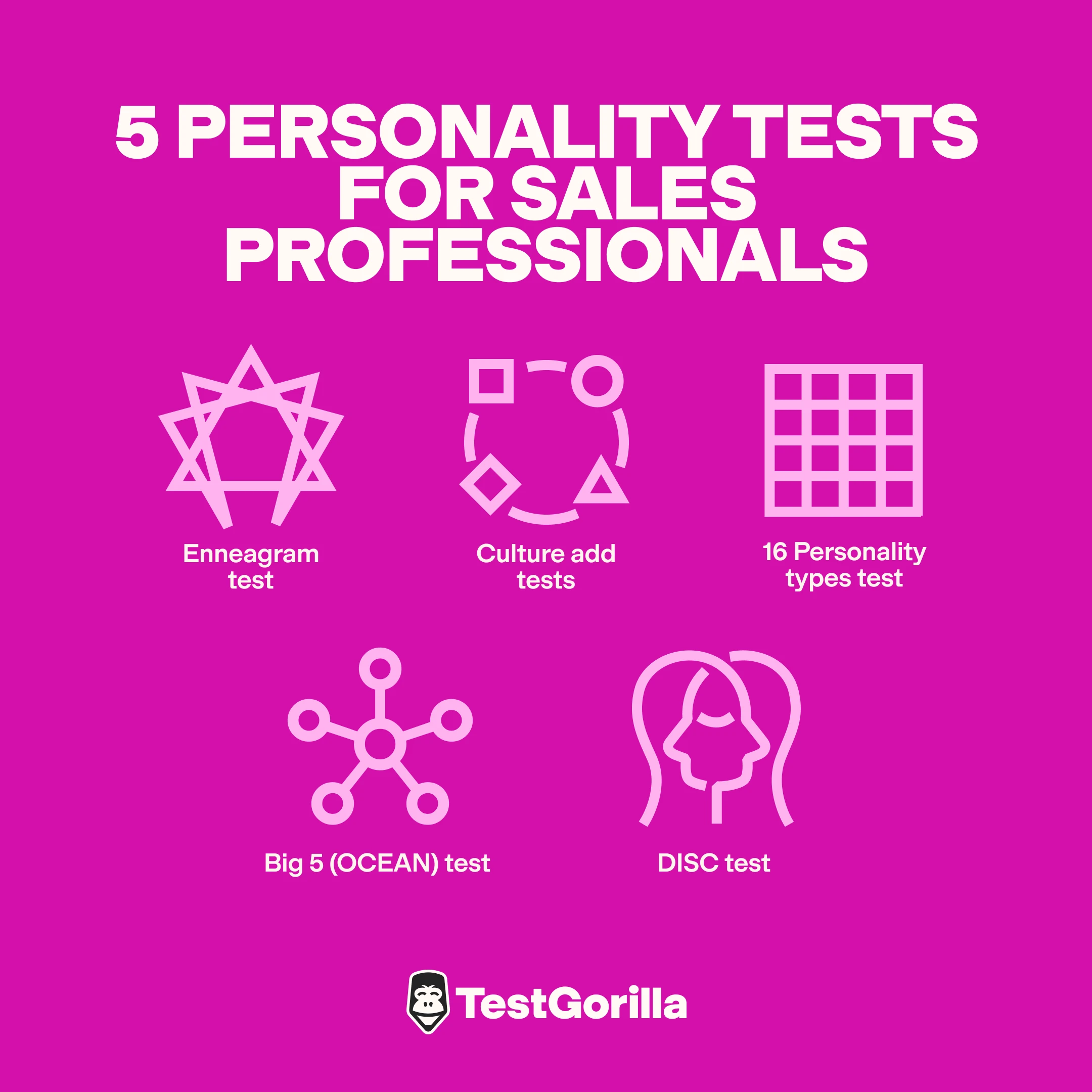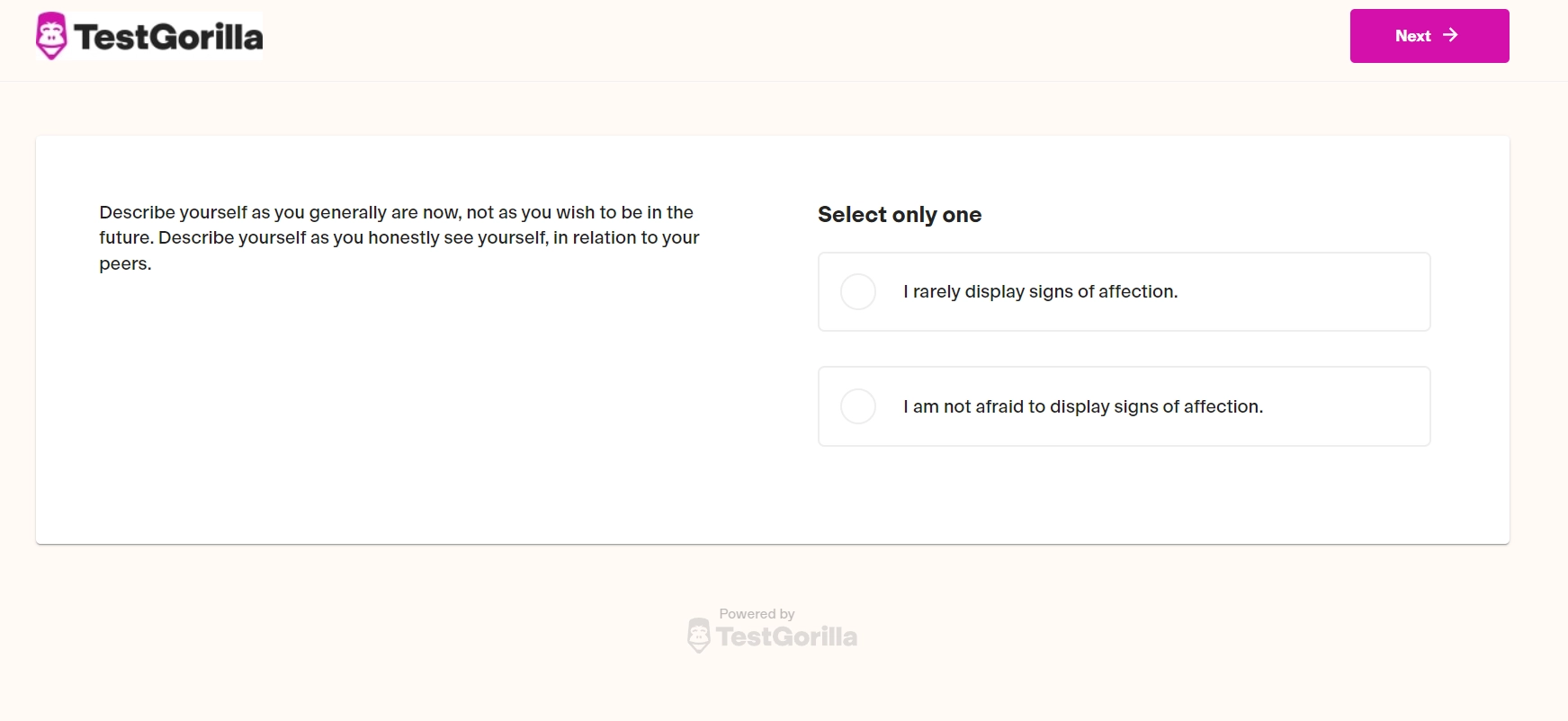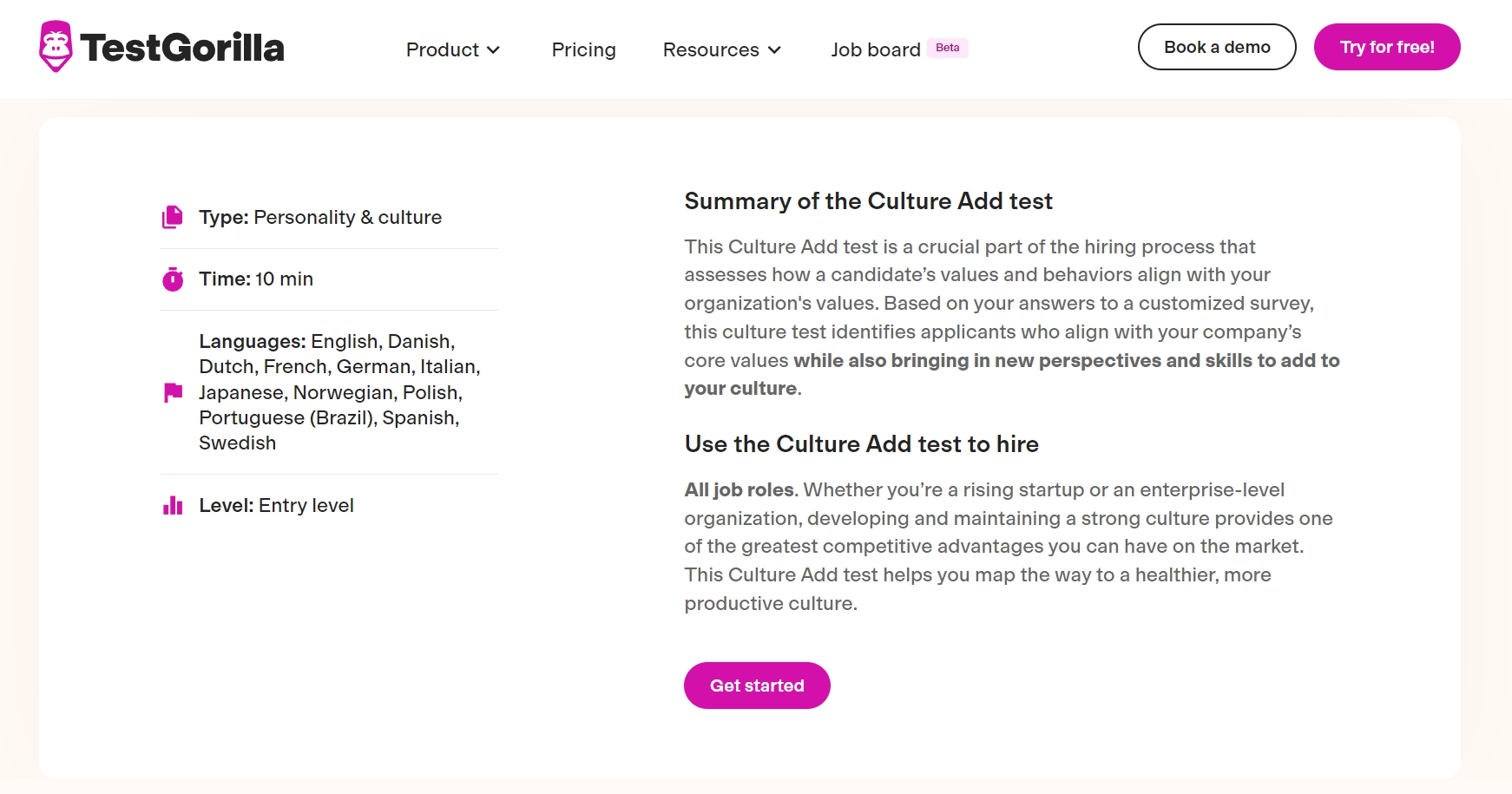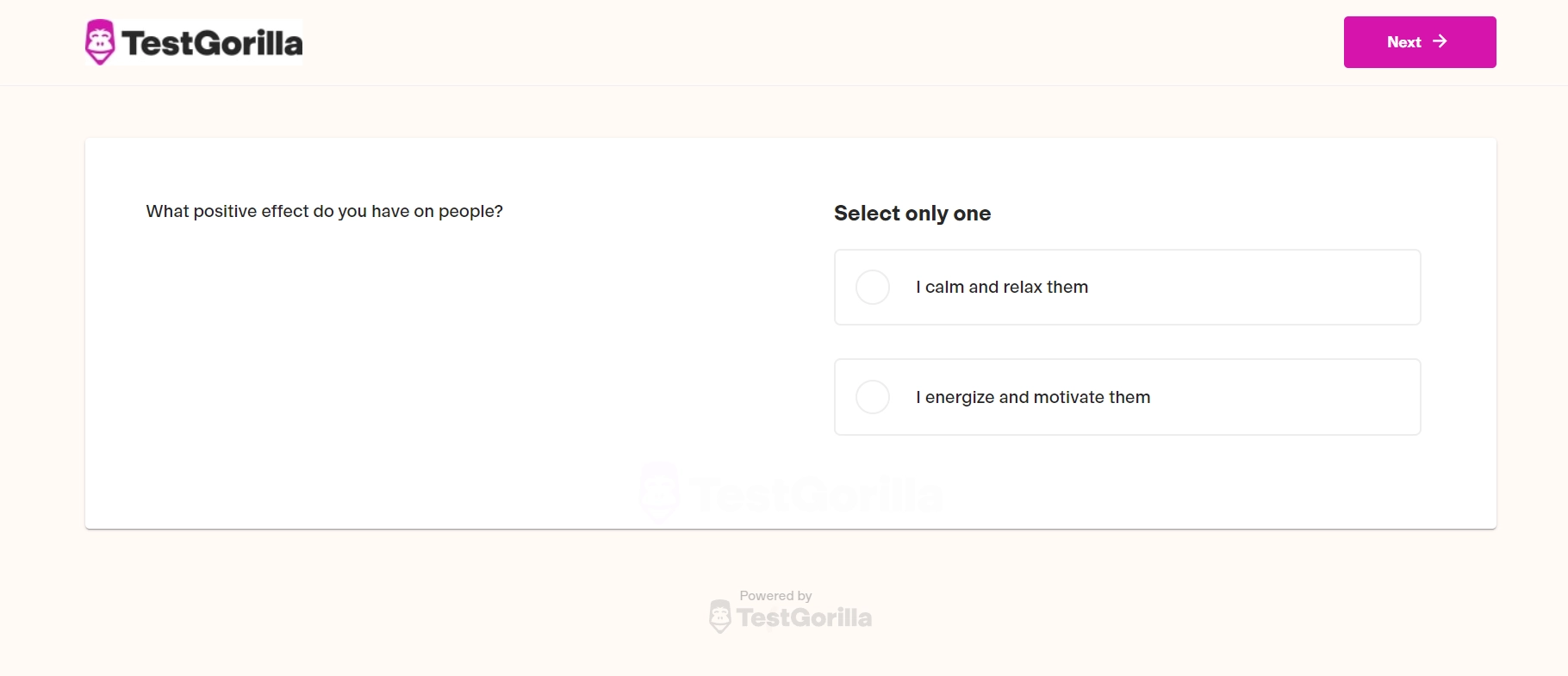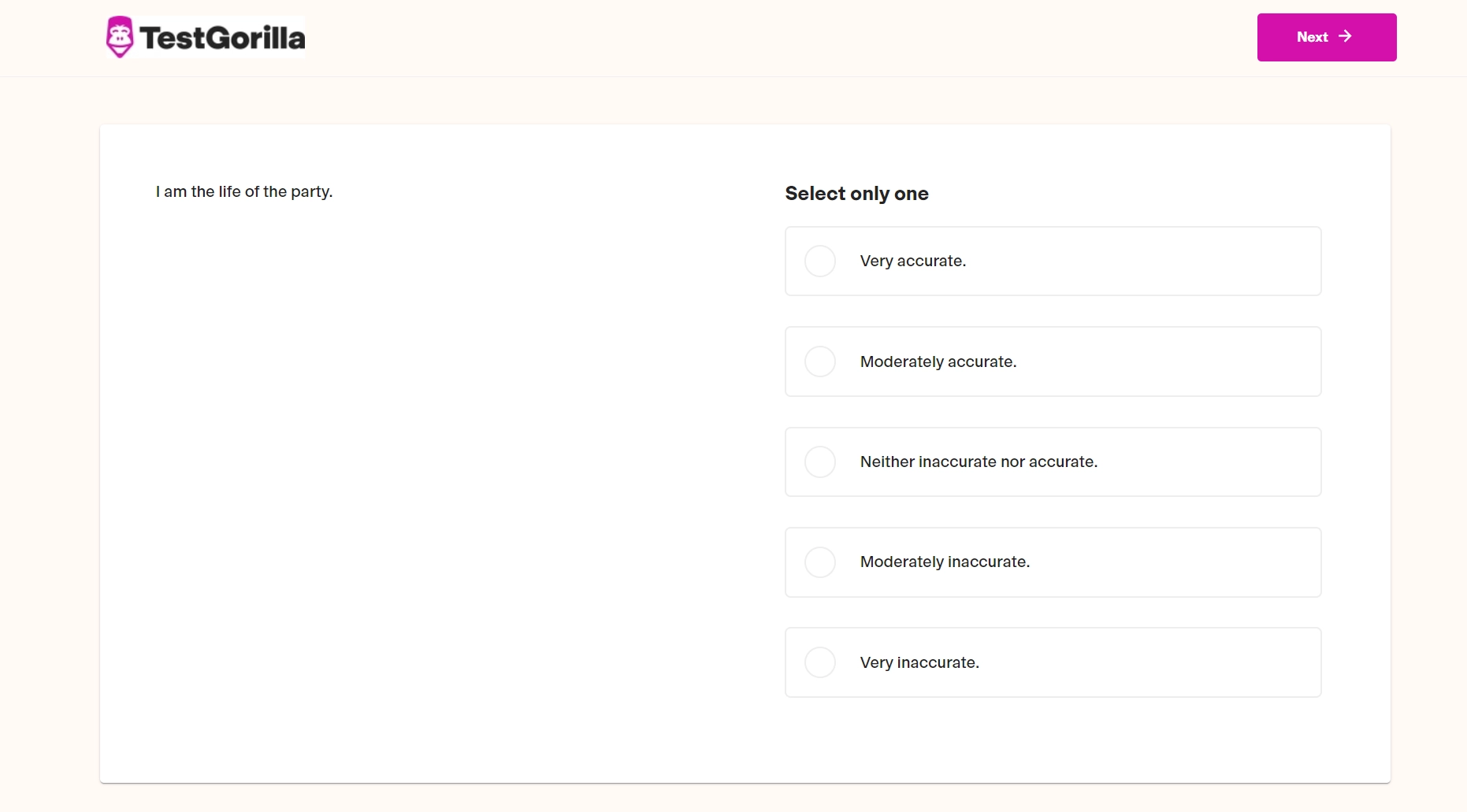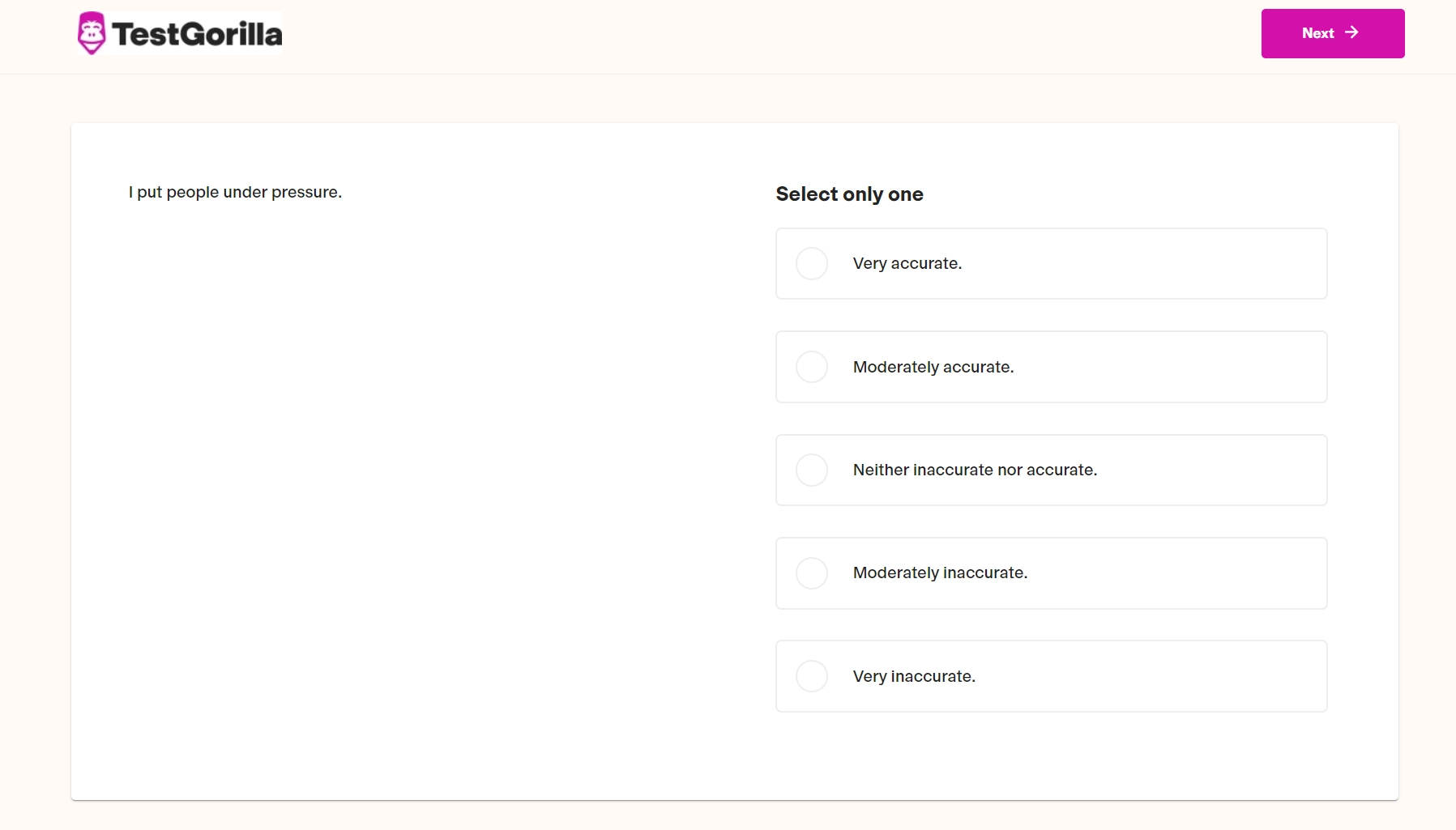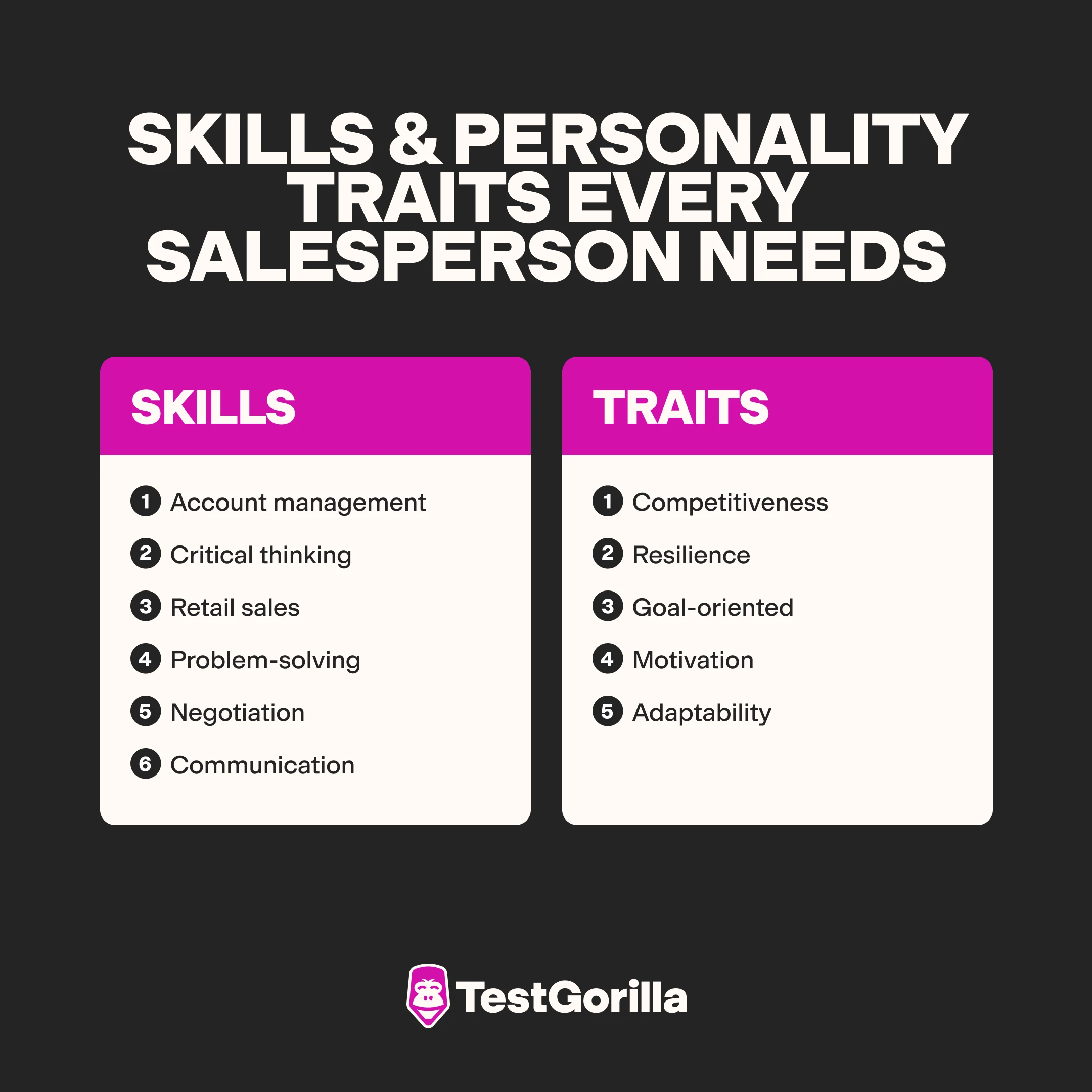Screen the top salespeople with personality tests from TestGorilla
Screening sales experts with personality tests is complicated. With so many options, how do you know which personality tests for sales candidates are best?
Pre-employment assessments with a sales personality test help you identify top salespeople candidates with valuable traits like resilience, emotional intelligence, and a proactive approach.
They reveal the perspectives and motivations of your salespeople, ensuring you know how to keep staff engaged by using these tests effectively.
In this article, we explore the best personality tests that improve your sales hiring decisions.
Why hiring teams use sales personality tests
Personality tests help hiring managers predict the job performance of a salesperson and their ability to contribute to the overall wellbeing of an organization by examining their core values, perspectives, and how they respond to different sales issues.
For instance, a proactive, agreeable, and intuitive salesperson with strong time management boosts workplace efficiency, builds stronger relationships with clients and colleagues, and pinpoints opportunities for business growth.
By looking beyond common skills like critical thinking and examining a salesperson’s perspectives and values, hiring managers can choose candidates who add value to the company culture.
Moreover, salesperson personality tests show who a person is and how they react, making it easier for managers to motivate, engage, and retain top performers.
Retention becomes crucial when considering the average turnover rate for sales reps hovers at around 35%.
Though no single personality test for salespeople automatically predicts an employee’s success, a combination of sales personality tests and hard and soft skill tests ensures you identify the best candidates based on your specific business goals, company culture, and the requirements of each sales role.
EXOGROUP, for instance, crafted a tailored assessment tool with TestGorilla that combined a DISC assessment with critical thinking, negotiation, and account management skills tests.
With this assessment, the company matched potential candidates to different sales roles more effectively and increased engagement throughout the recruitment lifecycle.
Create the ultimate sales personality assessment with TestGorilla
Combine personality tests for sales positions with relevant hard and soft skill tests to screen new candidates with TestGorilla.
Personality tests for sales: 5 top choices
The best personality questionnaire for sales professionals varies based on the characteristics you’re looking for and the roles you need to fill.
The following five tests provide the biggest return on investment when evaluating your salespeople’s personalities.
1. Enneagram test
The Enneagram test, created by Margarida R., a psychologist and psychometrist, follows the teachings of O. Ichazo and C. Naranjo and maps nine different personality types, their worldview, and how they’re linked. The model places each type at one tip of a nine-pointed diagram to visually represent the links between different types of sales personalities.
The nine points of the Enneagram represent the following types:
Here’s an example of the types of questions the Enneagram test asks:
As part of a sales personality assessment, an Enneagram test can offer insights into how sales candidates approach personal relationships, conduct themselves professionally, and adapt to specific situations.
Identifying a salesperson’s personality type offers valuable insight into where they can thrive in a sales team. For instance, Enneagram Type 8 (Challenger) personalities are assertive and direct, making them ideal for cold calling and leadership roles.
Type 2 (Helper) personalities with a “Go-Getter” trait are proactive and great at building rapport with others, making them ideal for standard sales rep roles.
2. Culture add tests
Using a personality test for sales hiring shouldn’t mean you focus on choosing people who share the same traits and attributes as your existing team members.
Diverse companies earn 2.5 times higher cash flow per employee, and inclusive teams are 25% more productive than their counterparts.
Our Culture Add test ensures you can take a diverse approach to the hiring process, focusing on people from different backgrounds who share the same values as your company while contributing unique skills and perspectives to your culture.
Designed for TestGorilla by Otto V., a Bain & Company veteran, the Culture add test enables companies to define the values that matter most to their organization. Candidates then select the values important to them in a survey.
Hiring managers match candidate's priorities to the company’s priorities and evaluate how well each candidate thrives in specific organizations.
Cultural add tests enable you to screen for candidates with a specific focus on collaboration, problem-solving, managing stress, or building morale.
They also help with employee retention, which is relevant, given that 46% of employees in the US and UK said they considered leaving their business because it didn’t adequately represent their values.
3. 16-Types test
The 16 Personalities test developed for TestGorilla by Sergei M., a licensed psychotherapist, helps you understand how sales candidates process information, interact with others, and make decisions.
The personality factor test evaluates candidates on four dimensions:
Introversion (I) versus extroversion (E)
Intuition (N) versus sensing (S)
Feeling (F) versus thinking (T)
Judging (J) versus perceiving (P)
Here’s an example question:
The various combinations of these traits form the framework for the 16 personality types. There is no ideal personality type for salespeople, but certain types are better suited to specific roles.
For example, candidates with an ENTJ personality type are more likely to excel in leadership roles because they’re effective at steering teams in the right direction.
Candidates with an INFP personality type have strong creativity and communication skills, making them ideal for sales positions that involve negotiating with clients.
Extroverts may be risk-takers who thrive in teams, while introverts prefer to work alone. Identifying how your salespeople work makes it easier to manage and retain them. Using the 16 Personality Types test alongside a DISC test, aptitude tests, and choice questions, Libab created a sales environment where 90% of newly hired candidates remain with the company for at least six months.
4. Big 5 (OCEAN) test
The Big 5 (OCEAN) Personality test, also designed by Margarida R., is based on the Five-Factor Model of personality, which splits personalities into five dimensions based on these factors:
Openness
Conscientiousness
Extroversion
Agreeableness
Emotional stability
TestGorilla’s Big 5 (OCEAN) test measures each of these traits and shows where on the continuum the candidate falls with test questions like the one below:
In a sales personality assessment test, the Big 5 identifies which candidates have the highest scores related to sales-specific traits, such as:
Openness: Many sales professionals need a high openness score. This score ensures they can be creative when engaging with clients and cope with sudden changes to their role, such as introducing new products or services.
Extraversion: Sales professionals also need a high level of extraversion to connect with new clients and colleagues comfortably. They need to feel comfortable confidently pitching products and showing expertise.
Agreeableness: Salespeople need to be assertive, but they must still be agreeable when collaborating with other team members on sales strategies.
Conversely, candidates with high neuroticism scores may struggle in high-pressure environments where they encounter customer objections, rejection, and tight deadlines.
A Big 5 personality test for sales jobs ensures you hire the most creative, collaborative, and outgoing candidates for your team.
5. DISC test
The DISC Personality test for sales, created by Margarida R., our expert in the field, helps you evaluate how sales candidates express their emotions. It classifies their behavior into four dimensions:
Dominance (D)
Influence (I)
Steadiness (S)
Conscientiousness (C)
The test presents candidates with 48 statements, which they must score from 1 (very inaccurate) to 5 (very accurate).
The results categorize applicants’ behavior into either one of the four behavior types or a combination of a given type and one of its adjacent types. As a result, there are 12 possible outcomes (four main behavioral types and eight combinations of two types).
Candidates with the D personality type are excellent at working independently and enjoy tackling challenging products. They are suited to sales positions involving complicated clients, such as enterprise sales.
Those with a dominant I personality type are optimistic, open, and energetic. They’re well-suited to fast-paced sales rep positions.
Applicants who are primarily an S personality type are calm, dependable, and loyal. They’re good at working as part of a sales team and cooperate well with others.
People who are primarily a C are accurate, independent, and analytical. They’re excellent at work that requires attention to detail, such as sales forecasting.
The DISC profile is one of the best personality tests for sales hiring because it helps hiring teams identify where candidates fit best into their sales team.
If you’re looking for a sales leader, prioritize candidates with the D personality type. On the other hand, if you need a reliable, loyal sales rep, look for an S personality type.
Screen for sales personality traits with TestGorilla
Identify the core personality traits of a great salesperson with TestGorilla’s wide collection of personality assessments.
The best insights on HR and recruitment, delivered to your inbox.
Biweekly updates. No spam. Unsubscribe any time.
What skills and personality traits does a salesperson need?
No matter the sales role an employee has or the industry they work in, they should have specific skills and traits that qualify them to be a salesperson. When designing a sales assessment for your candidates, focus on a combination of hard skills, soft skills, and personality tests for sales positions.
Soft and hard skills
Let’s take a look at the crucial soft and hard skills you need in sales professionals.
Critical hard/soft skill | Why it’s crucial |
Account management | Account management skills ensure salespeople can understand the needs of specific accounts, clients, and opportunities and deliver effective sales pitches. |
Critical thinking | Critical thinking skills enable salespeople to evaluate information (such as details about a prospect’s goals) and make sound judgments based on that knowledge. |
Retail sales | Candidates with retail sales skills know how to use product knowledge to craft effective pitches. They also excel at building rapport and maintaining relationships with clients. |
Problem-solving | Salespeople with strong problem-solving skills can prioritize tasks and their time effectively. They can also use data and logic to overcome buyer objections. |
Negotiation | Sales is also about negotiating a deal that benefits the client and the organization. A great salesperson has the negotiation skills to convert customers. |
Communication | A salesperson must be a great communicator who can listen to clients’ needs, handle objections, and explain a product's or service's best features in detail. |
Sales personality traits
Below, we look at some valuable personality traits for sales candidates.
Trait | Why it’s important |
Competitiveness | A great salesperson is highly competitive in their work. They take charge of the sales process and push themselves to close more deals. |
Resilience | Salespeople handle many rejections, objections, and stressful situations. They need to be resilient and capable of managing their emotions. |
Goal-oriented | Studies have found that goal-setting improves workers’ performance by 12% to 15%, even without financial incentives. The best salespeople constantly challenge themselves with new goals. |
Motivation | Salespeople should be self-starters and push themselves to reach their targets and goals. They need high levels of intrinsic motivation. |
Adaptability | Salespeople must constantly adapt to new buyer trends, products or services in their portfolio, and new challenges. |
Improve your sales hiring with TestGorilla’s personality tests for sales
Using the best personality tests for sales reps screening ensures you identify the best candidates for your team who share your company’s values and display powerful traits like resilience, adaptability, and intrinsic motivation.
However, there’s no single best personality test for sales teams. The right sales assessment should combine personality, hard, and soft skill tests to help you identify the right fit for the specific role you’re trying to fill.
TestGorilla’s library of more than 400 scientifically proven talent assessments allows you to create the perfect custom assessment for your sales candidates.
To learn more about creating the ideal sales assessment, book a live demo today.
Personality tests for sales FAQs
Do you still have a few questions about personality tests for sales? Find answers to four commonly asked questions below.
Is there one personality test that predicts success?
There’s no single personality test that can predict career success. However, sales personality assessments help you identify sales talent with the attributes, traits, and qualities that make them more likely to thrive in your organization. These tests also help you discover how to manage, motivate, and engage teams, improving retention.
What personality type is best for sales?
ESFJ: Best for account managers and after-sales professionals who support clients long-term
ESTP: Ideal for short-term projects, like new client acquisition
ENTJ: Best for salespeople in leadership roles, such as sales managers.
INTJ: Suitable for salespeople who need to explain solutions to customers
ISTP: Best for adaptable and flexible salespeople
What are the key considerations for interpreting personality test results in a sales context?
Understand the purpose of personality tests - to provide insights into the valuable attributes of a salesperson and how you should manage your teams.
Consider your business's values and priorities carefully, and map candidate attributes to find individuals who can deliver the best cultural add.
Prioritize attributes and traits based on the salesperson's responsibilities, duties, and the teams they work with.
What are the common questions asked in a personality test for sales?
Sales personality tests usually ask a range of forced-choice, statement-based, open-ended, and true or false questions. They may ask questions about how you interact with people and how you feel about specific situations. These questions aim to assess the personality traits of a salesperson and how they affect their role or position.
How much emphasis should be placed on the results of a sales assessment test?
Sales personality tests can offer a useful insight into the traits that make an individual well-suited for onboarding into the fast-paced and stressful sales world, such as creativity, resilience, proactivity, and intrinsic motivation. However, assessing other attributes, such as a salesperson’s soft and hard skills related to critical thinking, problem-solving, communication, and negotiation, is also important.
You've scrolled this far
Why not try TestGorilla for free, and see what happens when you put skills first.




